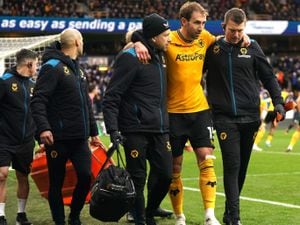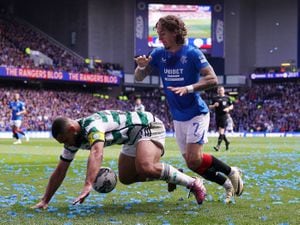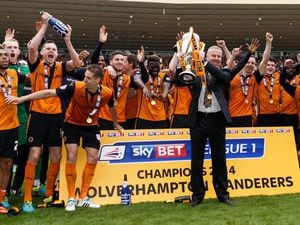Alan Hinton learned from Wolves legends
He cleaned the boots of Billy Wright and Jimmy Mullen. He played for Stan Cullis, Sir Alf Ramsey and Brian Clough.
He made his England Under-18 debut alongside Geoff Hurst and Nobby Stiles and Jimmy Greaves was a big fan of his crosses. Bobby Moore recommended he play in America. Which he did, going on to break a record for the number of assists set by Pele and George Best.
With a cast list like that, no wonder former Wolves winger Alan Hinton has written a book which really ought to be a blockbuster!
With the help of lifelong Wolves fan and successful writer Charlie Bamforth, Hinton has penned ‘Triumph and Tragedy‘, the story of an action-packed life which has taken him from Wednesbury to Seattle – and plenty more in between - as player, coach, ambassador and fan.
Oh, and he also used to work as a paperboy delivering the Express & Star, taking pride in delivering 105 papers within 30 minutes. Clearly a winger in the making, even then.
There has been plenty of triumph, plenty of trophies, including two League Championship titles with Derby, titles as a player with Dallas Tornado and Vancouver Whitecaps and a host of top coaching accolades.
And there has also been tragedy, most sadly and cruelly, the heart-wrenching loss of son Matthew to cancer at the age of nine.
Hinton too has had health problems, being diagnosed with bladder cancer several years ago, for which he underwent surgery and lengthy treatment and is now, thankfully, in remission.
But a one-hour long Zoom call which literally flies by finds him sitting in his living room in Seattle in rude health, breaking off only to proudly produce his England cap from his senior debut against France, or to gaze outside and describe how his beloved wife Joy is checking on the flowers.
“She loves flowers,” he says. Team Hinton is a strong and unbreakable union, a marriage of over 55 years and counting which overcame that most horrific of tests in the unbearable loss of a child.
His much-cherished daughter Tania and grandchildren Matteo, Alexia and Isabelle all live nearby, filling Hinton with so much pride and fun. At 78, he is still enjoying life.
And all three Hinton ‘boys’ – his brothers Brian and Roy still live in Pattingham – have each been married for over half a century.
They are in regular touch and at some point soon – pandemic permitting – Alan would love to take a trip back to the UK, to catch up with family, and to promote his book.
And to just talk about football. Obviously.
Because as much as Joy loves flowers, Alan loves football.
He is still as much of a fan as he always was, and isn’t shy in launching into an assessment of England’s recent march to the final of the European Championship.
“Yes I love the game, and I’m still really sad about England losing the final,” he admits.
“I was watching it here, with a bunch of English people…we were so mad!”
After over 60 years in the game, the passion and will-to-win are clearly still burning strongly even on the other side of the Atlantic.
After over 60 years in the game, it is difficult to know where to start!
So maybe it is best to start right at his roots, with Hinton still so incredibly proud of his Wednesbury birthplace and a modest but very happy upbringing thanks to parents Tom and Harriet.
“We came from very humble beginnings, we were poor but we never knew it,” Hinton recalls.
“Growing up my Mum insisted the three of us joined the church choir – life revolved around school, church and football, and it was a special time.”
Hinton and pal Roy Morley would watch both Wolves and West Bromwich Albion growing up – rivalries were different then! – sometimes sneaking under the turnstiles.
And when his football prowess came to the fore, both of those Black Country rivals were interested in taking him on.
Albion boss Vic Buckingham visited Hinton at home and suggested he find a job and train with the Baggies in the evening.
Wolves chief scout George Noakes hailed from Wednesbury, and recommended Hinton be taken onto the club’s groundstaff which, at the age of just under 15, he did.
That meant starting out in the youth ranks and working his way up through six different senior teams, as well as the series of other tasks that being a trainee entailed.
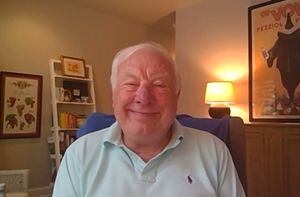
“We had to sweep the South Bank terraces after 30,000 people had stood on it, and that took a day and a half,” Hinton recalls.
“But we’d have a good old sing-song, and a system, to push all the rubbish down.
“And I remember helping to water the pitch before the big floodlit friendly with Honved, to stop them moving the ball so well.
“After that game myself and Roy Morley found our way into the Victoria Hotel to get (Ferenc) Puskas’s autograph!
“I would clean the boots of Billy Wright and Jimmy Mullen who were brilliant with me as well; Billy was such a wonderful man.”
Hinton’s debut came as an 18-year-old in an FA Cup tie against Huddersfield in January, 1961.
He played well in a 1-1 draw, but later that night was the passenger in a car driven by his friend which crashed, resulting in minor injuries resulting in missing the replay, which Wolves lost.
He had quickly grasped the iron-rod management style of the legendary Cullis, so the response to his accident probably came as no surprise.
“Cullis blamed me – he told me that if I had played, we’d have won,” says Hinton.
There are so many Cullis stories, including when Hinton discovered whilst on the groundstaff that Londoner Peter Faulkner was being paid twice as much as him.
He plucked up the courage – no mean feat at that time - to knock the door of the manager’s office, and walked out with a positive response having doubled his money.
On another occasion, Cullis had written to Hinton’s father to tell him he was in danger of not making the grade if he didn’t ‘toughen up’.
“My Dad went in to see him and told me I had to go with him – I didn’t want to, I thought Cullis would fire me,” says Hinton.
“My Dad marched in and before Stan could even take a breath he told him he had taken the afternoon off work so wasn’t getting paid at that moment.
“He said to Cullis, ‘do I know my son better than you?’ to which Stan had to reply with ‘yes, you are his father’.
“So my Dad replied: ‘Let me tell you how to handle him, put your arm around him every now and again and lead him on a piece of string, and one day he will play for England.’”
Did it work? Did Cullis change his attitude?
“No,” replies Hinton. “But I did play for England.”
The sort of tough love and discipline espoused by Cullis – known as ‘Sergeant Major’ – clearly paid dividends.
He remains comfortably the most successful manager in Wolves’ history.
He also kick-started Hinton’s career – the winger adept with both feet would make 75 appearances and score 29 goals for Wolves – but the relationship with his manager was all about substance rather than sentiment.
“I used to love playing over on the far side (Molineux Road), they were my people, and it was also opposite the tunnel and where Stan would be shouting at me!” Hinton recalls.
“I never saw a soft side to Stan Cullis.
“As a player he used to kick everyone, they all did in those days, but as a manager I never ever saw him laugh or share a joke with players.
“At the time it made me sad, but then that is just the way he was, and he enjoyed so much success.
“I am pleased that I saw him a few years later when I bumped into him at an awards dinner.
“I went up to him and said that if he didn’t recognise me I was going to kick him on the ankle!
“He did recognise me, and he was great, and said later that he enjoyed seeing me again and that I was the same nice young man as when I was younger.
“He was quite charming and that was nice to hear, but I guess as a player I just didn’t respond well to harsh language and treatment."
Even so, Hinton enjoyed so many highlights at Molineux.
A 7-0 win against Albion in which he scored two, a hat trick against Fulham which he would later remind former Cottagers’ striker Clint Dempsey about in Seattle; a great friendship and wing partnership with Terry Wharton, who signed his first Wolves contract on exactly the same day; being top scorer with 19 goals in the 1962/63 season as Wolves finished fifth.
But ultimately Hinton would depart, the following January, in controversial circumstances.
Wolves’ form had dipped, the natives were growing restless, and enroute to a home defeat against Nottingham Forest, the fans started booing.
Hinton thought he was the target – he wasn’t, it was Chris Crowe – but the damage was done, and he responded with a hand gesture, and let’s just say Wolves weren’t ‘two’ goals ahead at the time.
“It was irresponsible, I shouldn’t have done it, and I regret it even now,” he says.
“Cullis could have given me the opportunity to say sorry to the fans – they were my fans over there on that side – but he didn’t.
“He must have blown a fuse because he ended up trading me for Dick Le Flem from Nottingham Forest who was nowhere near as good as me.
“People say even now it might have been the worst trade in the history of the club, certainly from Cullis.
“I didn’t want to leave Wolves, I was broken-hearted, but it worked out for them and it worked out for me.
“The first time I then played against Wolves, I was really shaken to receive a great reception – it was an emotional moment without a doubt.”
Hinton prospered at the City Ground, helping Forest to finish second in the league during one of his three-and-a-half seasons, but it was his next move, within the East Midlands, where things took off even further.
There is, of course, so much in the book about his time at Derby County, the golden period in the Rams’ history as they were promoted to the First Division and then won the title twice, firstly under Brian Clough, and then Dave Mackay.
Derby fans will love it, but for our purposes, how about a compare and contrast of those three incredibly successful managers who remain icons of the sport?
Cullis, Clough and Ramsey. Some hat trick, that.
Clearly all three worked wonders for Hinton at different stages of his career, with Ramsey selecting him three times for England, a debut against France, fixture against Belgium in which he scored just days after his wedding (another story well worth a read in the book!) and a final cap against Wales.
Those latter two caps came after Hinton had moved on from Wolves to Forest and, unfortunately, Ramsey’s preference not to use out-and-out wingers, while clearly profitable as illustrated by 1966 World Cup glory, effectively froze out many with a penchant for hugging the touchline.
When it comes to that legendary triumvirate, it is clear even from the tone of his voice alone, that Hinton will forever hold Clough in the highest of reverence.
It isn’t just the fact that ‘Old Big ‘Ed’ took him to Derby, or indeed that he masterminded the first of those title successes, but his all-round approach as a manager which struck such a chord.
“Cloughie was the biggest influence for me and had the best personality for me,” Hinton explains.
“He knew when to laugh with a player, when to be strong, but most of all he knew how to win.
“He was the master at all that, and about getting the most out of players, based on their personality.
“If there were players who were nice and quiet he wouldn’t go after them so much, but those that were tough, like Archie Gemmill, he knew he could have some fun with.
“He used to say to Archie, ‘give the ball to Alan, he can play and you can’t’, and you would see all the lads rolling their eyes!
“What a player Archie was by the way, Cloughie just wanted to get him going, and I remember people saying he used to call his wife Betty and ask her to burn his toast on the day of a game, to get him in a bad mood!
“Cloughie knew how to play the banjo with everybody and he also had a very kind heart.
“When we lost our son Matthew, I remember him coming to see me at the cricket field by my house on a Sunday afternoon, asking me to go and play for him at Nottingham Forest.
“I couldn’t do it, having gone and played for Derby, but I know Cloughie was looking out for me.”
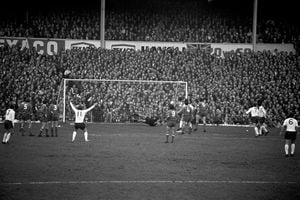
The chapter detailing the loss of Matthew to neuroblastoma, a rare cancer, at the age of just nine, and how the family tried to cope during his final days and months, is both a powerful and emotional read.
Hinton pauses for thought as he discusses the loss of his son which, all these years on, clearly still sparks some painful memories.
“That was a really difficult chapter to write, difficult for me and probably even more difficult for my wife,” he explains.
“We went through a lot of discussions, picking it up and then putting it down for a few days until we made sure we got it right.
“It is difficult to describe the loss of a child, and it didn’t just happen to us.
“It happened to Bob Wilson, a close friend of mine who wrote one of the forewords in the book, and also Cyril Knowles, Peter’s brother.
“There is always that question of why us? Why Bob and his family, why Cyril and his family?
“I was raised in a church environment and, while I am not a deeply religious man, I still believe.
“After Matthew died I was really anti-religion for a few years, but then I came to the conclusion that a lot of the good things that happened to us, that was Matthew shining a light – I really believe that.
“Matthew would have been in his early fifties now, and even though it has been a long time, he will never be forgotten.
“Life can be very cruel but in the end you have to pick yourself up, and that is part of the reason why I have told my story.”
Amid the understandable grief in response to Matthew’s passing, a couple of months later, Hinton found himself out of contract at Derby and, at 34, with little idea of his next step.
He tried but struggled to play part-time with non-league Borrowash Victoria and pick up the threads of their knitwear and clothing business, and Derby generously organised a testimonial despite him not having completed the requisite ten years of service.
But it was the intervention of another key person in Hinton’s life, then Dallas Tornado coach Al Miller, on the recommendation of Bobby Moore, was to prove crucial in launching a love affair with football in America now spanning over four decades.
“I only found this out a year or so ago, something which Al did after he took me to Dallas,” says Hinton.
“He had told Kenny Cooper, who was born in Blackpool, that he had signed a winger, who was a little bit out of shape and needed a lot of attention because he was hurting.
“He told Kenny he would be sharing a room with me, that he needed to make me laugh and cheer me up and it helped.
“At the same time I went back to Cloughie and asked if there was any chance my good friend John O’Hare, who was at Forest, could come over to Dallas to play for the summer.
“Cloughie replied to say he would help however he could and John and his family came over and were in the apartment next to us.
“Slowly I came to grips with the fact that we had to continue after Matthew’s passing, and the football went well, and I was even made captain, and there aren’t many times a left winger is made captain!”
That was the start of the adventure with football in North America in which Hinton flourished, both as a player with Dallas and Vancouver Whitecaps – surpassing that assists record of Best and Pele – and then as a coach.
He was in the dugout with Tulsa Roughnecks, Seattle Sounders, Vancouver Whitecaps, Tacoma Stars and then worked in youth soccer in Seattle, becoming known as ‘Mr Soccer’ as he later moved on to roles within the media and as an ambassador.
As a player he had loved playing alongside the likes of Wharton, Ron Flowers, Bill Slater, Peter Broadbent and Ted Farmer. And as a coach in America, the Wolves links continued by working with Kenny Hibbitt, Steve Daley, Phil Parkes and Paul Bradshaw.
If he perhaps enjoyed more success, and more silverware, away from Molineux, Wolves still holds very fond memories for Hinton who is keen to fire questions back about all things current and thoughts about the change in coach and the season ahead.
On his last visit back, he was able to sit in the Directors Box and congratulate Wolves chairman Jeff Shi for ‘lighting up the club’ once again.
The Wolves link has also played a key part in the publication of the book, both via advice and guidance from former Express & Star sports journalists Dave Harrison, David Instone and Steve Gordos, and Billy Wright’s biographer, Norman Giller.
And of course via Bamforth himself, who first started writing in the Wolves programme back in 1985, has contributed to the Wolves Heroes website for many years, and previously penned a book about Wolves goalkeepers – ‘In Keeping with The Wolves’.
Hinton was in the Wolves team for the first game Bamforth ever saw, a 3-0 defeat to Bolton in 1962, and little did that young fan know at the time that he would go on to enjoy the ‘singular honour’ and ‘absolute privilege’ of teaming up for ‘Triumph and Tragedy’ almost 60 years later.
Ah, back to that figure of 60 years, and Hinton’s extraordinary impact on football, which, as detailed in his book, has spanned two continents as well as six decades.
What then, does he take out of such a long-standing and eventful career? What advice would he pass on to others now trying to follow in his footsteps and make their way within the game?
“Try and find a champion – that is my advice,” he replies.
“I had a lot of champions at Wolves – Bill Shorthouse, Joe Gardiner, Jack Dowen, Peter Broadbent, Billy Wright.
“I needed a different type of champion at Derby and Forest because I was more mature then.
“But find a champion, find an older and more successful person and sit down and have a cup of coffee with them, because they will want to help you become a better person.
“We lost Jimmy Gabriel a few weeks ago, another great coach, a lovely Scottish guy off the field but very tough on it.
“One of the great things he has left behind, one I will never forget, is how he would sit down with a player he was coaching.
“He would say to them, ‘how can you and I work together to make you a better player’?
“That’s a beautiful thing to say to a player and there’s not a player in the world who wouldn’t react positively.
“It’s a wonderful approach, and one I wish I had thought of myself!”
Hinton was nicknamed ‘Noddy’ during his time at Wolves for the way his head nodded up and down when he burst down the flanks.
Later at Derby he was affectionately christened ‘Gladys’ in deference to his blond perm and white boots, as well as his elegant wingplay.
But to many football fans, to many players who he has coached, and still keeps in touch with to this day, it just may be that Hinton was, in fact, their champion.
’Triumph and Tragedy – the Alan Hinton story’, from Geoffrey Publications, is now available from https://wolvesbooks.net/books

